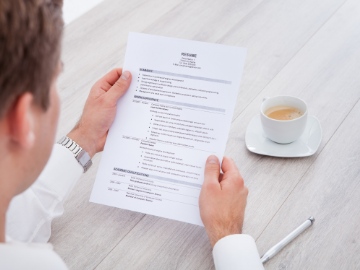5 Resignation Letter Examples to Help You Politely Resign

Now it's time. You've made the choice to move forward in your career. Maybe you've taken a new opportunity, or you just know it's time for something different.
A resignation letter is a formal document or email that tells your employer you're leaving your job. How you write it can leave a lasting impression.
This article provides resignation letter examples that you can use in different situations, alongside expert tips for writing with clarity and respect.
Why do you need to submit a resignation letter?
A resignation letter is important because it formally tells your employer that you're leaving and clearly states your last working day. As one HR professional from the University of Southern California explains, "You always want to be in control of that end date instead of the company or your employer."
In many states, employers are required to pay for any unused vacation time. Without a written record of the employee's final working day, the last accrual date might be unclear or disputed.
It also helps you leave on good terms. "One thing you don't want to do is burn your bridges," she added. Another HR expert added that submitting a resignation letter is "a sign of respect for the company, your manager, and your co-workers."
5 resignation letter examples
Here are five professional letters of resignation, depending on your reason for leaving.
1. Resignation letter example: Personal reasons
Dear Mr. Galvez,
I'm writing to let you know that I will be stepping down from my role as Benefits Coordinator at Holloway Group, with my last day of work being June 21, 2025.
This decision comes after some recent personal matters that require my full attention outside of work. I'm grateful for the time I've spent with the team and for the support you've shown me throughout my employment.
Over the next two weeks, I'll do my part to close out my responsibilities and assist in transitioning any outstanding work.
I hope we can keep in touch, and I would truly appreciate the opportunity to ask for a reference when I'm ready to return to the workforce.
Sincerely,
Kendra Mace
2. Resignation letter example: New job opportunity
Dear Ms. Ordonez,
I'm writing to formally resign from my position as Junior Brand Strategist at North Elm Creative. I plan to continue working through July 7, 2025, which gives us time to manage a proper transition.
I've accepted an offer from another company that provides a new path for career advancement. It's been an amazing experience working with you, and I'm especially thankful for the encouragement and feedback you've given me.
In the coming weeks, I'll ensure all outstanding projects are in order and support the handover process to the best of my ability.
Please know that I value the time we've worked together, and I hope we'll cross paths again in the future.
Sincerely,
Teo Rivas
3. Resignation letter example: Relocation
Dear Mr. Basco,
This letter is to notify you of my resignation from my role as IT support technician at Peakline Technologies. I will remain available until June 21, 2025, to support the transition period and wrap up current projects.
I will be moving to another province to be closer to my family, which unfortunately means leaving my current position. I'm thankful for all the opportunities to grow professionally here and for the trust placed in me by both you and the team.
I'll do my best to wrap up my current workload and help ensure a smooth transition for whoever steps into the role.
Wishing you continued success, and I hope we stay in contact.
Sincerely,
Roland Yue
4. Resignation letter example: Career change
Dear Ms. Chen,
Please accept this letter as notice of my departure from Delta Rho Ventures, where I've served as Operations Analyst. I intend to stay until June 21, 2025, to complete my handover.
I've made the choice to pursue a career in environmental design-a field that aligns more closely with my long-term goals. I've appreciated every opportunity here and have learned a great deal from my time under your leadership.
Over the next two weeks, I'll work to hand off my projects and assist in training where needed to help make the transition easier.
Thank you again for everything. I look forward to staying in touch.
Sincerely,
Isela Ward
5. Resignation letter example: Job dissatisfaction
Dear Mr. Panganiban,
I'm writing to formally resign from my position as QA Tester at VertaMotion Studios. I'll complete my remaining duties up until June 21, 2025, and will help with the transition as best I can.
After taking time to reflect, I've decided to seek a role that's a better match for my working style and career goals. While the experience here hasn't been the right fit, I'm still appreciative of the opportunity and the time I've spent on this team.
I'll make sure to wrap up my assignments and support the handover process as best as possible before I leave.
Wishing you all the best in your future projects.
Sincerely,
Callum Drexler
What to include in a resignation letter?
Here are some key elements of a good resignation letter:
- Formal salutation: Use a polite and professional greeting such as "Dear Ms. Alvarez" or "Dear Mr. Lee." Even if you have a friendly relationship with your manager, a formal salutation keeps the tone respectful.
- Clear statement of resignation and last date: In the first paragraph, clearly state that you are resigning. Mention your current job title, the company name, the formal notice period you are giving (e.g., two weeks' notice), and your last working day. Avoid including any negative remarks. For example: "I am resigning from my role as product designer at ABC Company. My last day will be June 21, 2025."
- Closing: End your letter politely. Thank your manager or team, and say you'd like to keep in touch if it makes sense. Use a closing like "Sincerely" or "With appreciation," then add your name. If it's a printed letter, include your signature too.
Tips for writing a formal resignation letter
There is no perfect formula for writing a resignation letter, but here are some helpful tips to consider, according to experts:
- Be clear about your resignation and last working day
Clearly say that you are resigning and include the exact date of your last working day. This helps avoid confusion, gives your employer time to prepare, and protects your final pay and unused benefits. - Keep it short and professional
You don't need to explain much. A few short, clear paragraphs are enough. Stay formal and avoid emotional or extra details, since your letter becomes part of your record. - Maintain a positive or neutral tone
Even if you're unhappy, avoid making negative comments about the company, your boss, or coworkers. Staying respectful helps protect your reputation. Try to end on a positive note by thanking the company for the experience. - Say thank you
Saying thank you for the opportunity, experience, or support shows professionalism. It helps you leave on a good note and is something your employer will value. - Offer to assist with the transition
A short line like "I'm happy to help train someone new or organize my work to make the handover easier" shows that you're responsible and willing to support the team before you leave. Even if it's not needed, it leaves a good impression.
Before sending your formal resignation letter, experts suggest speaking with your manager in person first, then following up with a written notice. If you're not sure what to write, the resignation templates or examples above can help you. Remember, how you leave a job matters just as much as how you start one.


